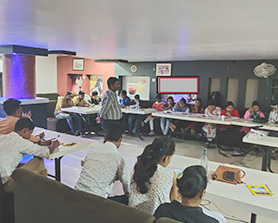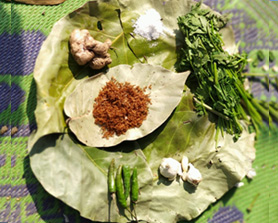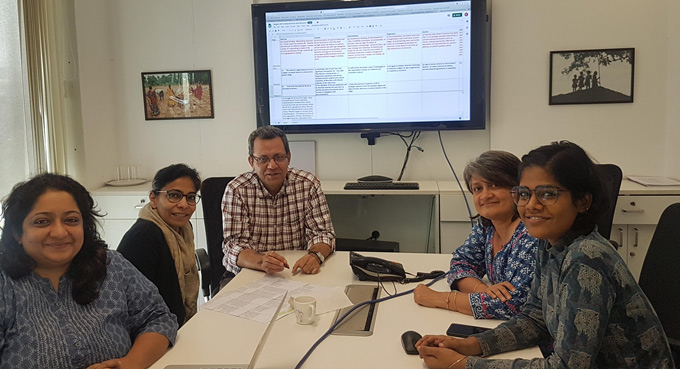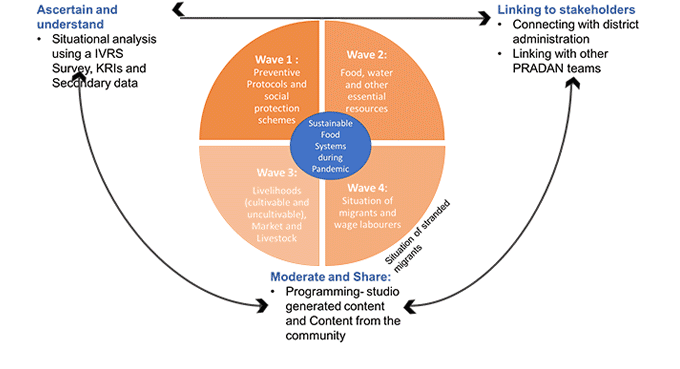 |
|
|
View in Browser
|
|
|
Glimpses from Research
June 2020 |
|
Imagining Inclusion: Lessons from the Migrant Worker Crisis |
|
“I joined the research wing of PRADAN a few weeks after the lockdown
began. Our work quickly introduced me to the hardships being faced
at multiple fronts by India’s rural communities. The most
overwhelming experience for me was recording the struggles faced by
migrant workers who were stranded across Indian states.”
-Ayesha Pattnaik,
Research Associate, PRADAN
To read more about Ayesha’s experience and what she
found out,
Click here |
|
 |
|
|
एक सफल सर्वे कार्य की आधारभूत नियम, महत्वपूर्ण बिंदु एवं
सावधानियाँ |
 |
|
“किसी भी फील्ड सर्वे में चार महत्वपूर्ण स्तम्भ होते है, जिसमे एक
अच्छी प्रश्नावली, सर्वेकर्ता की अच्छी प्रशिक्षण, सर्वेकर्ता की
भूमिका और सूपर्वाइज़र के संचालन का अहम योगदान होता है। प्रदान में
पिछले कई सालों में मुझे फील्ड सर्वे करने और संचालन करने का मौका मिला
है। उनम सभी प्रक्रियाओं और विभिन्न प्रोजेक्ट के माध्यम से मैंने जो
कुछ सीखा है और अनुभव किया है, उन सभी को बिंदुओं के माध्यम से यहाँ
लिखने की कोशिश की है।”
- Amit Kumar, Senior Assistant, PRADAN
To read more about Amit’s experience and key points
around conducting a successful survey on the field,
Click here |
|
|
Development, Dilemmas and (In) Digestion: What eating
‘Cheeti ki Chatni’ does! |
|
“What is it that eating cheeti ka chatni does? Scientifically, due
to its anti-bacterial properties, it aids digestion. Culturally,
it’s considered to be therapeutic by many indigenous communities,
and thus it endorses a marginalized worldview. For a global project
like ours it is exoticness exemplified. This blog is about a dilemma
that emerged while working on the uncultivable ‘wild’ food aspect of
the project. It is here that the hierarchy of food and the social
relations reflected in what is ‘civil’ and what is considered ‘wild’
becomes most acute.”
-Gautam Bisht,
Research Associate, PRADAN
To read Gautam's blog
Click here |
|
 |
|
|
|
Organisational life Cycle (OLC) project: Papers and Presentation |
 |
|
|
This study is aimed at contributing to the theoretical framework of studying lifecycle stages in non-profit organizations. It involved two studies; 1) a systematic review of literature to synthesise a comprehensive five-stage life cycle model for non-profits; and 2) corroborating the model by mapping the journey of PRADAN across this five lifecycle stages. This five-stage model of growth can aid nonprofit leaders in decision making and navigating transitions. We share this exciting work through a working paper titled "The Five Phases of Growth and Decline in Non-Profit Organizations" and case study are in process to be published and used by ISDM in their curriculum. The team is also thrilled to share that our abstract titled “From Genesis to Metamorphosis: Life cycle stages of nonprofit organizations” submitted to the conference organised by the Association for Nonprofit and Social Economy Research (ANSER) has been accepted for presentation. The theme of this year’s conference, to be held in June is “Nonprofits and the Social Economy: Bridging Divides”
Click here to read more about the project |
|
|
|
CHIRAG Project: Lives and livelihoods at the time of COVID |
|
 |
|
|
The CHIRAG project has been reorganised to engage with issues related to COVID and the lockdown since March. To what extent can the Interactive Voice Response System (IVRS) to in part impact the sustainable food systems of the community during the current pandemic and crisis. The three objectives of this post-pandemic approach taken in the project are: a) to enable a space for rural community members (also migrants) to voice their concerns, grievances and opinions on the corona crisis, lockdown and their food and health situation; and to provide information on the disease, bust myths, create awareness on (food-related) government schemes to the community; b) Understand the current situation in the villages on how the pandemic has impacted the lives and livelihoods of the rural people. This is being done by conducting a situational analysis survey through IVRS system; and c) Linking the grievances and concerns received by the community to the district administration and PRADAN teams. Currently, we are analysing the content recorded and shared by the community and designing weekly content to reach them. Arundhita Bhanjdeo leads the research, Gautam Bisht leads the programming and Shuvajit Chakraborty, the local stakeholder engagement in the project.
Click here to read more about the project |
|
|
|
Copyright © 2020 PRADAN
. All Rights Reserved. |
|
|









